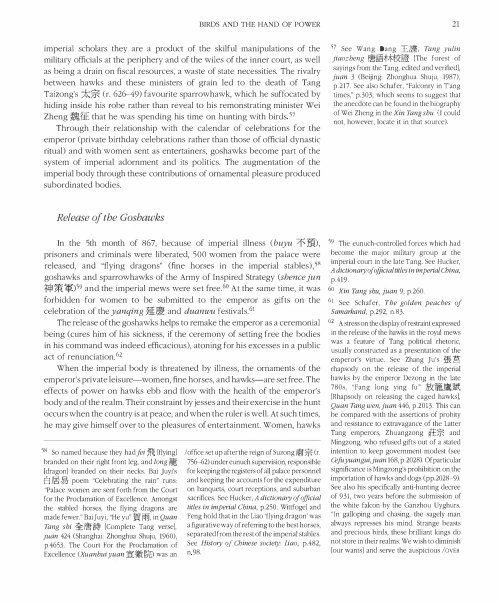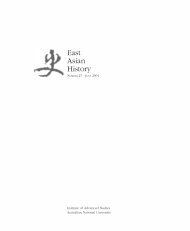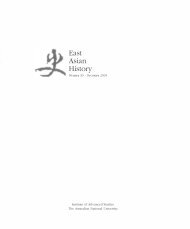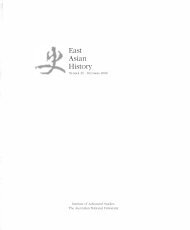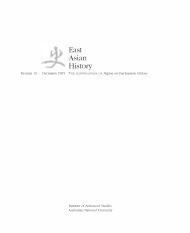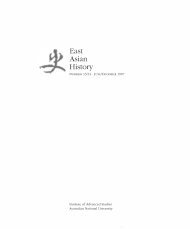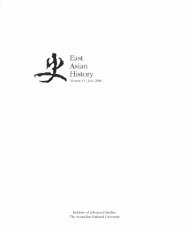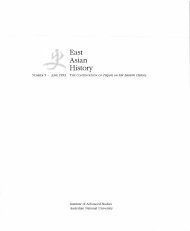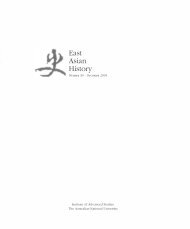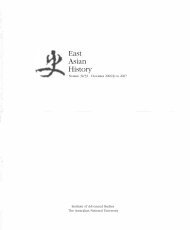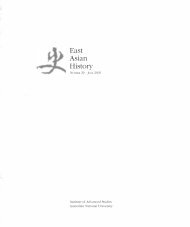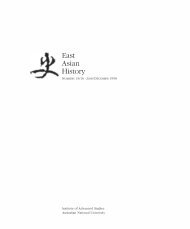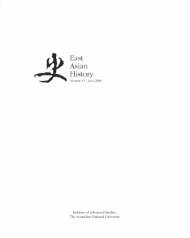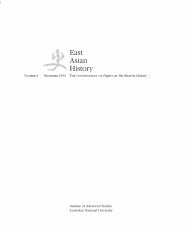East Asian History - ANU
East Asian History - ANU
East Asian History - ANU
- No tags were found...
You also want an ePaper? Increase the reach of your titles
YUMPU automatically turns print PDFs into web optimized ePapers that Google loves.
BIRDS AND THE HAND OF POWER21imperial scholars they are a product of the skilful manipulations of themilitary officials at the periphery and of the wiles of the inner court, as wellas being a drain on fiscal resources, a waste of state necessities. The rivalrybetween hawks and these ministers of grain led to the death of TangTaizong's ** (r. 626-49) favourite sparrowhawk, which he suffocated byhiding inside his robe rather than reveal to his remonstrating minister WeiZheng 1lE that he was spending his time on hunting with birds 57Through their relationship with the calendar of celebrations for theemperor (private birthday celebrations rather than those of official dynasticritual) and with women sent as entertainers, goshawks become part of thesystem of imperial adornment and its polities. The augmentation of theimperial body through these contributions of ornamental pleasure producedsubordinated bodies.57 See Wang Dang I, Tang yulinjiaozheng m§M*fx§ [The forest ofsayings from the Tang, edited and verifiedl,juan 3 (Beijing: Zhonghua Shuju, 1987),p.217. See also Schafer, "Falconry in T'angtimes," p.303, which seems to suggest thatthe anecdote can be found in the biographyof Wei Zheng in the Xin Tang shu. (l couldnot, however, locate it in that source).Release of the GoshawksIn the 5th month of 867, because of imperial illness (buyu /fJID,prisoners and criminals were liberated, 500 women from the palace werereleased, and "flying dragons" (fine horses in the imperial stables),58goshawks and sparrowhawks of the Army of Inspired Strategy (shence junt$Jr!J)59 and the imperial mews were set free.6o At the same time, it wasforbidden for women to be submitted to the emperor as gifts on thecelebration of the yanqing J1f!l and duanwu festivals.61The release of the goshawks helps to remake the emperor as a ceremonialbeing (cures him of his sickness, if the ceremony of setting free the bodiesin his command was indeed efficacious), atoning for his excesses in a publicact of renunciation 62When the imperial body is threatened by illness, the ornaments of theemperor's private leisure-women, fine horses, and hawks-are set free. Theeffects of power on hawks ebb and flow with the health of the emperor'sbody and of the realm. Their constraint by jesses and their exercise in the huntoccurs when the country is at peace, and when the ruler is well. At such times,he may give himself over to the pleasures of entertainment. Women, hawks58 So named because they hadfei m [flyinglbranded on their right front leg, and long fm[dragon] branded on their necks. Bai Juyi'sB m poem "Celebrating the rain" runs:"Palace women are sent forth from the Courtfor the Proclamation of Excellence. Amongstthe stabled horses, the flying dragons aremade fewer." BaiJuyi, "He yu" m, in QuanTang shi :i;ng'iR¥ [Complete Tang versel,juan 424 (Shanghai: Zhonghua Shuju, 1960),p.4653. The Court For the Proclamation ofExcellence (Xuanhui yuan '§' 117'G) was anloffice set up after the reign of Suzong IHj (r.756-62) under eunuch supervision, responsiblefor keeping the registers of all palace personneland keeping the accounts for the expenditureon banquets, court receptions, and suburbansacrifices. See Hucker, A dictionary of officialtitles in imperial China, p.250. Wittfogel andFeng hold that in the Liao 'flying dragon' wasa figurative way of referring to the best horses,separated from the rest of the imperial stables.See <strong>History</strong> qf Chinese society: Liao, p.482,n98.59 The eunuch-controlled forces which hadbecome the major military group at theimperial court in the late Tang. See Hucker,A dictionary qf o fiCial titles in imperial China,p.419.60 Xin Tang shu, juan 9, p.260.6 1 See Schafer, The golden peaches ofSamarkand, p.292, n.83.62 A stress on the display of restraint expressedin the release of the hawks in the royal mewswas a feature of Tang political rhetoric,usually constructed as a presentation of theemperor's virtue. See Zhang Ju's 1§;rhapsody on the release of the imperialhawks by the emperor DelOng in the late780s, "Fang long ying fu " 1tdillJ!if\[Rhapsody on releasing the caged hawks],Quan Tang wen, juan 446, p.2013. This canbe compared with the assertions of probityand resistance to extravagance of the LatterTang emperors, ZhuanglOng !l±* andMinglOng, who refused gifts out of a statedintention to keep government modest (seeCefuyuangui,juan 168, p.2028). Of particularsignificance is MinglOng's prohibition on theimportation of hawks and dogs (pp.2028-9).See also his specifically anti-hunting decreeof 931, two years before the submission ofthe white falcon by the Ganzhou Uyghurs."In galloping and chaSing, the sagely manalways represses his mind. Strange beastsand precious birds, these brilliant kings donot store in their realms. We wish to diminish[our wants] and serve the auspicious lOVER


